When my friend Ernest was a boy, his mother smuggled him from Guinea-Bissau across the borders to The Gambia to save him from the civil war. In 2007 whilst in The Gambia, he twisted my arm and convinced me to go and see his country, his dad and brothers.
|
 |
 |
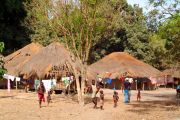 |
 |
 |
 |
 |
 |
A small village on Bubaque island
 |
 |
From The Gambia, I had two borders to cross: with Casamance (Senegal) and then with Guinea-Bissau. It was painless at the borders and the immigration and customs officers were friendly. I was preparing for the worst. Many people were preparing me, in fact. Although it seemed that all went smoothly, many police and military checkpoints, slowed me down considerably. I thought it was frustrating but soon I was faced with crossing the Cacheu River. The ferry stopped operating at 7 p.m. I was stuck. With many other people and vehicles. This meant that I had to spend a night in the middle of nowhere. This middle of nowhere was actually €3 across the river from Sao Vicente. The side I was stranded at, had absolutely no facilities; no hotel, no shop, no bar, no place or anyone selling food.
I asked Ernest to take a canoe across the river and fetch some beers from Sao Vicente, so we could party and forget about the issue if being stuck. He got very stressed with our situation and perhaps thought that I was going to be angry. I had to tell them not to be alarmed because I didn’t care and that I was going to make a party for everyone stuck with us. The beers fetched from Sao Vicente didn’t last long and as we got increasingly more thirsty, fresh ideas kept popping in our heads how to secure more provisions. Canoes stopped crossing the river, so I put Ernest in a taxi (also stuck with us) and sent them to a local shop a few kilometres back towards Ingore village to bring more beer. They were gone for two hours! For a thirsty man it is like eternity! Finally, they came at about 2 a.m. and the party resumed sheepishly.
The ferry didn’t come until 10 a.m. I didn’t think all the cars would fit on it, but they all did. The ferry was too heavy and the low tide kept it stuck on the river bank for an hour. In about a year (2009) this should no longer be a problem. A bridge was being built. Two other bridges were already in place, and the crossing at Sao Vicente was the last one.
|
|
| Favourite spots: |
Bijagos, an archipelago of small islands, was so remote from the civilisation’s point of view, that my friend Ernest knew very little about it. He had heard about it tough. He referred to the Bijagos people, who lived on the islands, as really black and tough. However, he had never ventured to the islands in his life. The archipelago is an important biosphere reserve, an escape destination for migratory birds and sea turtles. Life on the islands had been simple for centuries. It is hard life, too. The Bijagos people have little to sustain themselves. Apart from fish, they have nothing.
The islands are the country’s main centre of tourism. They are truly stunning! And it is not only about the beaches. It is the whole package. Little secluded villages, saltwater crocks and hippos, giant turtles, water fowl. The main draw is the world’s class deep sea fishing. Several islands have comfortable fishermen lodges, usually run by the French. I stayed at Bubaque island.
|
|
| What's really great: |
Bubaque’s main attraction are the beaches and... beaches. Apart from that, there is seriously little else to do there. It’s however a good base for exploring Orango islands, where saltwater crocodiles, hippopotamuses and turtles can be spotted, and other islands, too.
I could only spend a day on the island, and with absolutely no plan, I just visited a few villages and went to the main beach, at the south-western end. I took a local guy with me, Nandinho, who also accompanied me on the boat ride from Bissau. I liked him, because he smiled constantly. Not only when talking to me but also when dealing with others. Although Ernest referred to the Bijagos as tough people, they were very friendly to me and rather good looking.
Nandinho said I ought to get some sweets for the kids and tobacco for chiefs of the villages. I made him in charge of dispensing the items as appropriate. To be honest, I didn’t find the villages anything special compared to many African places I had seen before.
|
|
| Sights: |
 |
 |
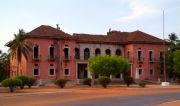 |
 |
 |
 |
 |
 |
Bissau - ruined Presidential Palace
 |
 |
The first sight of the country’s capital city, right on the coast of the Atlantic Ocean, at the mouth of the Geba River, left me rather unimpressed. Allegedly, it used to be an attractive little place once. However, the Guinea Bissau Civil War ruined all important and nice buildings. Even the Presidential Palace was destroyed! As a consequence, there is relatively little to see in the capital. Sightseeing takes only couple of hours and at a very sluggish pace.
I took a stroll along Bissau’s main artery - Avenida Amilcar Cabral. At the days of its glory, it must have been a great avenue. Grand colonial buildings, now mainly occupied by government offices, make a quite an imposing impression. There is also a great cathedral opposite ruins of something now completely unrecognisable, remnants of the terrible civil war.
By the harbour, there’s an old, lovely but crumbling Portuguese quarter, and a large fort. The fort is still in use by the military and completely off limits for visitors.
|
|
| Accommodations: |
 |
 |
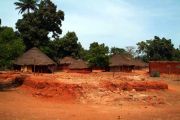 |
 |
 |
 |
 |
 |
Small village on Bubaque island
 |
 |
On Bubaque, I saw many defunct hotels and establishments, some of which must have been exceptionally grand, judging by their scale and actual location. They were now decaying, which was a sad sight. Apparently, it would be too much of a struggle for the locals or foreigners to bring them to their glory, or at least make them operational again. Yet, there were many other, up to date options, like Casa Afrikana. Some very, very nice (not cheap) and some more basic, but great and cheap (like Chez Dora, where I stayed).
In Bissau, hotels are not plentiful and poor value. But there are bound to be more soon. I tried one night at a great one Residencial Coimbra just off Ave A.Cabral and one night at very grotty (but safe) Ta-Mar in the old Portuguese quarter. There is also a very new, and so far the most expensive, I think they call it Palace, it’s 3km from the centre (if machine works, they accept credit cards!).
|
|
| Nightlife: |
Nightlife in Bissau was legendary due to abundant local music scene. However, the partying relies on electricity. For Bissau it’s an issue, since power cuts lost their meaning. The capital suffered (when I visited) from a permanent loss of power. And only occasionally, it would return on a haphazard basis. That is bad news for night clubs and partygoers. Including me. When I visited one of the more popular boogie spots, the Tropicana, was dark and quiet.
On Bubaque, I went down to the port only just to sit down and have a beer! The bar, called Dalilann was my first stop. The next station was a ‘djazz’ bar, which instead of jazz played music from Senegal and Cabo Verde. It was super - located almost exactly opposite the Tatumi Discoteque.
Tatumi was completely dark inside. A few violet fluorescent lamps attached to the ceiling kept revealing dancers’ white clothing and teeth. Fortunately, Tatumi was located in the part of town, which was connected to the communal power generator.
|
|
| Hangouts: |
In Bissau, directly at the front of the fort, there is a nameless bar serving cold beers and a limited selection of soft drinks. It appears as a pleasant place shaded by giant trees. It has a nice garden with white plastic tables and chairs and a roofed area with simple wooden tables and seats. However, as I spend a two or three hours there, a fine selection of rather dodgy characters came. I did not intend to spend so much time there, however it took me a while to finalise a deal for a boat transfer to the Bijagos archipelago.
On Bubaque, there were a few idyllic beaches only frequented by local cattle. When I arrived at the Praia Bruce, it took my breath away. Its sand was fine as powder. It was vast and empty. Only a few cows were wandering around (what were they eating?). I simply loved it! I have no words...
|
|
| Restaurants: |
 |
 |
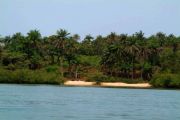 |
 |
 |
 |
 |
 |
One of the small Bijagos islands
 |
 |
It is not easy to get to the islands from Bissau. The pirogues, referred to as ‘public transport’ are often overloaded. They do not carry any safety equipment, leak and one had to put up with the smell of fish and various species of domestic animals. And the boat takes from four to six hours to reach the capital. It is a way of travelling of course, but since they often upend, I was too scared and had to look for alternatives. There are couple of travel agents in Bissau, who can help to get a ticket on large fast boat (€40 one way). On the islands, ask for Laurent, who has a lodge and organises fishing trips. The ride with Laurent is fast and comfortable. I could clearly see that he enjoyed fast boats and I reached Bissau in 90 minutes. If he has fishing clients to take back to Bissau, he charges only 25,000 CFA. The best value ever!
Restaurants? In Bissau - more and more open up, some really good! On Bubaque - Chez Dora is the best, she grills probably the best fish in the world.
|
|
| Other recommendations: |
 |
 |
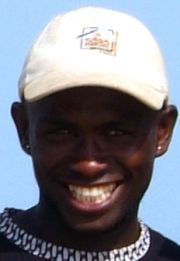 |
 |
 |
 |
 |
 |
Nandinho - one of the friendly Bijagos from Bubaque
 |
 |
I was under the impression that the people from the mainland Guinea Bissau were not particularly friendly. I guess it must just be the ones from the capital city, which chose to be difficult and hardly communicative. Or it was simply my bad luck that I did not meet many friendly faces. But it was the same in Bafata, in the north-eastern part of the country. I shared that with Ernest and he became grumpy. He said that they must have thought we were Senegalese whom they hated for the war (?).
The Bijagos, at the other hand, turned to be exceptionally welcoming, warm-hearted and huggable. The fact that tourism in Guinea Bissau starts and ends on the islands, one would expect that the locals would have developed more distance towards visitors. For they had been isolated for ages and often described as wild or even savage. On a contrary! They have so much affection to tourists that it is hard to describe. When I visited a few villages, everyone wanted to shake my hand. It felt great!
|
|
Published on Friday February 15th, 2008
|
|
 Publish on Facebook
Publish on Facebook
|
Fri, Mar 14 2008 - 01:40 PM
 by alfonsovasco
| i never heard about this place before reading your nice report |
Sat, Feb 16 2008 - 07:22 PM
 by rangutan by rangutan
| Always a good mixture of facts and personal opinions and always with suitable photography. Well done! |
Sat, Feb 16 2008 - 04:26 AM
 by jorgesanchez by jorgesanchez
| Apart from the text of the report, I also like your feelings when you go with your friend to his country, for friendship and camaderia. Good traveler! |
| Information: |
| Login if you are a member, or sign up for a free membership to rate this report and to earn globo points! |
|
| Grenada |
|
|
 |
| Guatemala |
|
|
 |
| Guernsey |
|
|
 |
| Guinea-Bissau |
|
|
 |
| Guyana |
|
|
 |
| Honduras |
|
|
 |
| Hong Kong |
|
|
 |
| Hungary |
|
|
 |
| Iceland |
|
|
 |
| India |
|
|
|
|
|
|
|
|
 |
| Indonesia |
|
|
|
|
|

|
